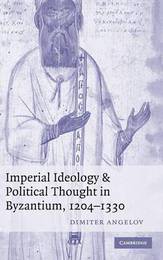
|
Imperial Ideology and Political Thought in Byzantium, 1204-1330
Hardback
Main Details
| Title |
Imperial Ideology and Political Thought in Byzantium, 1204-1330
|
| Authors and Contributors |
By (author) Dimiter Angelov
|
| Physical Properties |
| Format:Hardback | | Pages:474 | | Dimensions(mm): Height 229,Width 152 |
|
| ISBN/Barcode |
9780521857031
|
| Classifications | Dewey:321.030949509022 |
|---|
| Audience | | Professional & Vocational | |
|---|
|
Publishing Details |
| Publisher |
Cambridge University Press
|
| Imprint |
Cambridge University Press
|
| Publication Date |
8 February 2007 |
| Publication Country |
United Kingdom
|
Description
This study is the first to systematically investigate Byzantine imperial ideology, court rhetoric and political thought after the Latin conquest of Constantinople in 1204 - in the Nicaean state (1204-61) and during the early period of the restored empire of the Palaiologoi. The book explores Byzantine political imagination at a time of crisis when the Empire ceased to be a first-rate power in the Mediterranean. It investigates the correspondence and fissures between official political rhetoric, on the one hand, and the political ideas of lay thinkers and churchmen, on the other. Through the analysis of a wide body of sources, a picture of Byzantine political thought emerges which differs significantly from the traditional one. The period saw refreshing developments in court rhetoric and political thought, some with interesting parallels in the medieval and Renaissance West, which arose in response to the new historical realities.
Author Biography
Dimiter Angelov is a Research Fellow and Lecturer in the Centre for Byzantine, Ottoman and Modern Greek Studies at the University of Birmingham. He studied at Harvard University and has also taught at Western Michigan University.
Reviews"This volume, which began as a doctoral dissertation, succeeds in presenting a very comprehensive, clear and scholarly picture of Byzantine political thinking in a moment of crisis. It is a remarkable scholarly achievement, and it reads very well. Angelov's book is an important contribution to Byzantine studies and a paradigm of research." --Comitatus
|